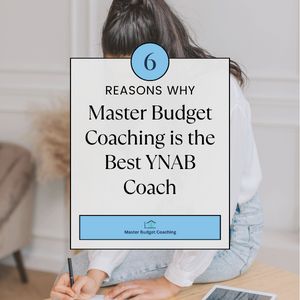Are you ready to take control of your finances and embark on a journey toward financial freedom? If you're using You Need a Budget (YNAB) to manage your money but need that extra guidance and support, look no further than Master Budget Coaching. As your dedicated YNAB budget coach, we're committed to helping you achieve your financial goals and unlock the full potential of your budgeting journey.
Why Choose Master Budget Coaching as Your YNAB Coach?
1. Expertise in You Need a Budget (YNAB): At Master Budget Coaching, our coaches specialize in the intricacies of YNAB. We understand the software inside out, and we're well-versed in leveraging its features to create personalized budgeting strategies tailored to your unique financial situation.
2. Personalized Coaching for Your Goals: No two financial journeys are the same, and that's why our YNAB coaches focus on providing personalized guidance. Whether your goal is to pay off debt, build an emergency fund, or save for a major life event, we work closely with you to create a roadmap for success.
3. Accountability and Support: We believe that accountability is key to financial success. Our coaches serve as your partners on this journey, offering continuous support, motivation, and guidance. We're here to celebrate your victories and help you navigate any challenges that may arise.
4. In-Depth Budget Analysis: Understanding your spending patterns is crucial for effective budgeting. Our YNAB coaches conduct thorough budget analyses to identify areas for improvement, ensuring that every dollar is allocated purposefully toward your financial priorities.
5. Proven Track Record: Master Budget Coaching has a proven track record of empowering individuals to achieve their financial goals. Our success stories speak volumes about the impact of our coaching services on the lives of our clients. Check out our testimonials to see the transformations that others have experienced.
6. Continuous Learning and Updates: The financial landscape is ever-evolving, and so are budgeting strategies. Our YNAB coaches stay up-to-date with the latest trends and updates in personal finance. We incorporate this knowledge into our coaching sessions to provide you with the most relevant and effective guidance.
How Master Budget Coaching Works:
- Initial Consultation: Our coaching journey begins with a thorough understanding of your financial goals, challenges, and priorities. During the initial consultation, we assess your current financial situation and discuss the roadmap for achieving your objectives.
- Personalized Budgeting Strategy: Based on the information gathered, your YNAB coach develops a personalized budgeting strategy using the YNAB platform. This strategy aligns with your short-term and long-term financial goals, ensuring a clear path to success.
- Regular Check-Ins: Our coaching relationship is ongoing. We schedule regular check-ins to review your progress, address any concerns, and make adjustments to your budgeting strategy as needed. These sessions are an opportunity to ask questions, gain insights, and stay motivated.
- Continuous Support: Master Budget Coaching is not just about numbers; it's about your financial well-being. We provide continuous support through various channels, ensuring that you have the resources and encouragement needed to stay on track.
Ready to Transform Your Finances?
Choosing Master Budget Coaching as your YNAB budget coach is a commitment to your financial success. Take the first step towards a brighter financial future by partnering with our experienced coaches. Let's turn your financial goals into a reality, one budget at a time.
Contact us today to schedule your initial consultation and embark on a transformative journey with Master Budget Coaching. Your financial success starts here!





